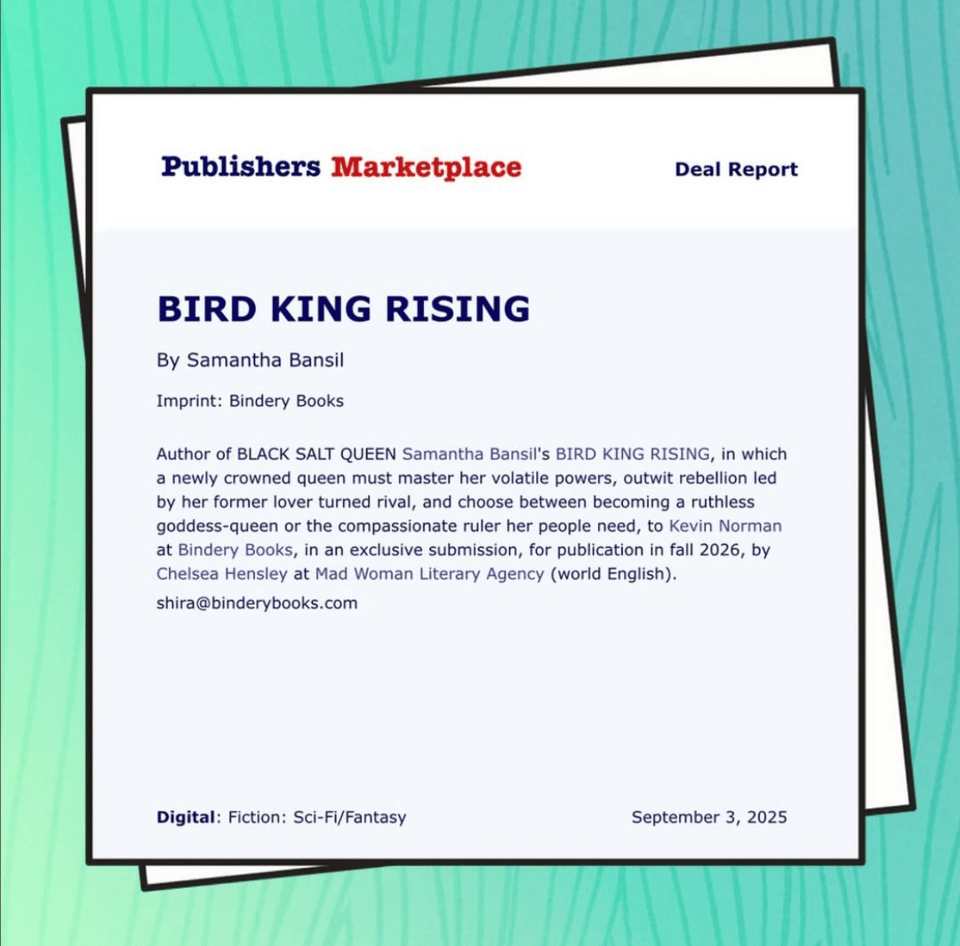Sequels, slop & sumptuous prose
On book 2, the encroaching dangers of algorithmic content and AI slop, and humanity’s need for sumptuous (and, yes, “superfluous”) prose.
Dear friend,
My writing practice has been in free fall lately (much like the state of the world). But after taking most of the summer off to travel, reconnect with friends, and consume my weight in well-chilled rosé and freshly caught seafood, I expect to return to the drafting cave soon.
Because—you guessed it—BLACK SALT QUEEN is getting a sequel!
A few weeks back, we had the pleasure of announcing BIRD KING RISING, to be published in fall 2026. To say that I’m excited would be a gross understatement. I’ve been dying to write the sequel for YEARS now.
BIRD KING RISING will explore the deepening divides between the ruling families of Maynara. Expect even more morally grey female characters, a slow-burn romance, cat-and-mouse games, and the ultimate Gatdula vs. Kulaw showdown.

✏️ Authorly musings:
As I mentally prepare myself to dive into revisions (there’s no sugar-coating it: I’m scared), I’ve been thinking a lot about how I want to improve and what matters to me as a writer.
BLACK SALT QUEEN wasn’t just my debut novel—it was the first manuscript I had ever finished. While the imposter syndrome was rough, it was absolute bliss to have written for so long with nothing cluttering my mind other than the voices of my characters.
Now that my first book is out in the world, my thoughts are far more crowded. I hear the voices of trusted writing colleagues, the amorphous and ever-changing market, and, yes, my readers.
I know, I know—Goodreads isn’t meant for us authors. I must admit, I do read reviews on occasion. While the reception has been positive overall, BLACK SALT QUEEN is not (nor should it be) shielded from criticism. And when it comes to feedback, I’ve learned that it doesn’t matter so much what people are saying but rather why they’re saying it.
Across Goodreads, the vast majority of lackluster reviews boil down to a mismatch in taste. That is completely valid. But sometimes, it seems there is a small yet discernible expectation for authors to get to the goddamn point.
A couple weeks ago, Alix E. Harrow’s latest newsletter landed in my inbox, titled “on purple prose.” She discusses the current trend toward simpler, sleeker, shorter prose that lends itself more easily to Instagram quotes. What happens to prose that doesn’t fit into the modern, more postable mold?
In many cases, subtle dialogue soaked in meaning gets glossed over. Quieter, emotion-laden scenes get reduced to juvenile excess. Setting, clothing, or food descriptions are met with impatience; these are major aspects of culture and world-building, but, somehow, they shouldn’t take up too much space in “serious” works.
What’s clear is that, across genres, style has taken a backseat. Less and less do we see those lush, descriptive sentences you just want to bask in. Perhaps it’s easier for us to digest—but at what cost?
Around the same time, I watched Jon Stewart’s interview with Maria Ressa, a Filipino journalist who has been speaking truth to power for decades. They discussed the role social media has played in the rise of authoritarianism both in the Philippines and the US. When talking about the recipe for politically manipulative content, Jon Stewart says:
You watch MAHA talk about, 'we have to get rid of ultra-processed foods. It’s killing us, it’s making us fat…’ But nobody talks about ultra-processed speech.
Because this is about more than loving a metaphor or a food description. This is about our collective ability to tolerate complexity—both in written text and the real world.
We talk a lot about optimizing content for the algorithm. The goal is to hook users within the first few seconds. It works even better if it’s laced with fear, anger, or hate. But what happens if most of the information we encounter is designed to 1) give us a dopamine hit and 2) be consumed in the blink of an eye, with little push toward further reflection or inquiry?
We lose appreciation for unoptimized text. We forget the difference between content and art. We scorn complexity. We say “it’s not that deep.” What’s worse, we refuse to swim.
But I haven’t lost hope. There will always be people who appreciate the art of the written word—not the colorless slop pumped out by LLMs, nor the algorithmic equivalent of a potato chip—but rather text written by actual humans, with its winding descriptions and complex idiosyncrasies.
And there will always be an appetite for vibrant, well-crafted prose. A need for sweet, superfluous beauty.
Because true art demands no optimization. True art simply needs to exist.
💌 What I’m loving lately:
Immaculate Conception by Ling Ling Huang. This book stayed with me. The rawness of artistic jealous—we know it well. It’s topical, especially when it comes to the collision of art and tech, as well as the far-reaching consequences of generative AI for creative work. I can only wish the billionaires of our world were half as interested in funding the arts as the ones in the novel (but I digress).
Empire of AI by Karen Hao. I just started this book, and it’s a sobering look into the history of OpenAI. I highly recommend if you’re concerned about AI’s insidious effects on society—and if you’re wondering where we can go from here.
🔗 Links:
Add BLACK SALT QUEEN to your TBR on Storygraph and Goodreads.
Order BLACK SALT QUEEN via Amazon, Barnes & Noble, Bookshop.org, and wherever books are sold!
All my love,
S.B.